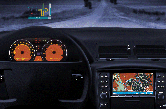

RESEARCH FROM THE INTERNATIONAL INFORMATICS
INSTITUTE
© 1995-2006 International
Informatics Institute, Inc. Some Rights Reserved.
This work is licensed under a
Creative Commons License.
Read our privacy guidelines.
Interactive maps and travel guides are helpful, and the back seat of a minivan filled with screaming children is an obvious site for TV, but new video displays and satellite receivers in RVs, trucks, taxi-cabs, buses, subways and even — God help us — the dashboard and the front passenger visor are putting television on the road.
According to J.D. Power & Associates, last year 850,000 vehicles were sold with a factory-installed navigation system, and 28 percent of new 2003 full-size sport utility vehicles had a passenger entertainment system installed (up from 7 percent in 2002).
Judging fcrom the hot products in the automotive aftermarket and the action on MTV's Pimp My Ride, in-car video (and killer audio) are making those enldess hours in traffic easier for millions of driver. By the end of the decade, some 22 million automotive DVD systems will be hypnotizing back seat passengers around the world. And coming soon are satellite and Internet links to the car and new video in all kinds of moving vehicles — underground, on the road and in the air.
 Dashboard
navigation systems like this
Siemens VDO connect live GPS (Global Positioning Systems) data with CD or
DVD geographical information on a video display. (Note the head-up display
that projects directions onto the windshield.) Since it's illegal in
many places to watch TV while driving, installers are required to disable
front seat DVD
playback while the car is moving.
Dashboard
navigation systems like this
Siemens VDO connect live GPS (Global Positioning Systems) data with CD or
DVD geographical information on a video display. (Note the head-up display
that projects directions onto the windshield.) Since it's illegal in
many places to watch TV while driving, installers are required to disable
front seat DVD
playback while the car is moving.

 A
typical factory-installed rear seat entertainment
configuration puts LCD video monitors in the headrests and hides the DVD
player under the seat or in the armrest. Others
flip down from the ceiling.
A
typical factory-installed rear seat entertainment
configuration puts LCD video monitors in the headrests and hides the DVD
player under the seat or in the armrest. Others
flip down from the ceiling.
 For
parents, the DVD is controlled by Mom and Dad from the front seat. More
troubling are LCDs in the front seat
visors or even
in the
steering wheel.
For
parents, the DVD is controlled by Mom and Dad from the front seat. More
troubling are LCDs in the front seat
visors or even
in the
steering wheel.
 Raytheon's
Night Driver package for Hummer SUVs extends a driver's vision five times
further at night
Raytheon's
Night Driver package for Hummer SUVs extends a driver's vision five times
further at night![]() using an infrared video camera hidden in the front bumper. Yet another camera
can be hidden in the rear bumper, feeding a monitor built into the rear view
so you can see behind. We figure 10 video screens per car is about the max:
see
Hummer Video Madness.
using an infrared video camera hidden in the front bumper. Yet another camera
can be hidden in the rear bumper, feeding a monitor built into the rear view
so you can see behind. We figure 10 video screens per car is about the max:
see
Hummer Video Madness.
 For
about $2,200, the 5-inch-high roof-mounted RaySat
StingRay mobile satellite antenna receives satellite TV signals throughout
North America, Europe and Asia. A sophisticated tracking system provides
uninterrupted satellite access while the car is in motion. A new 2-inch-high
version could be built-in by car manufacturers. Internet access is planned.
(See also TracVision.)
For
about $2,200, the 5-inch-high roof-mounted RaySat
StingRay mobile satellite antenna receives satellite TV signals throughout
North America, Europe and Asia. A sophisticated tracking system provides
uninterrupted satellite access while the car is in motion. A new 2-inch-high
version could be built-in by car manufacturers. Internet access is planned.
(See also TracVision.)
 The
#3 subway line in Seoul, South Korea, broadcasts recorded soap operas on twin
LCD screens mounted on the subway ceiling, according to
Korean blogger Goodhyun.
Live subterranean TV is the target of Fourth Wall Media's
ONEStop Network in
Toronto, where subways carry about 850,000 riders per day, with each ride
averaging 17 minutes. In an
article on AKA.TV, Fourth Wall's president Mike Gingris said that, on the
subway cars, the proposed screens will only be seen towards the center of the
cars, without sound.
The
#3 subway line in Seoul, South Korea, broadcasts recorded soap operas on twin
LCD screens mounted on the subway ceiling, according to
Korean blogger Goodhyun.
Live subterranean TV is the target of Fourth Wall Media's
ONEStop Network in
Toronto, where subways carry about 850,000 riders per day, with each ride
averaging 17 minutes. In an
article on AKA.TV, Fourth Wall's president Mike Gingris said that, on the
subway cars, the proposed screens will only be seen towards the center of the
cars, without sound.
 A
little off-topic and certainly not video,
Sidetrack
Technologies ads installed in the Boston subway system deliver moving
images like an elaborate flip book. Some 400 printed images stretching nearly
1,000 feet along the tunnel wall are animated into full motion by the speed of
the passing train, in synch with a proprietary lighting system, creating a 15
second, “television-like” commercial. A
Quicktime
video of local news coverage shows how it works.
A
little off-topic and certainly not video,
Sidetrack
Technologies ads installed in the Boston subway system deliver moving
images like an elaborate flip book. Some 400 printed images stretching nearly
1,000 feet along the tunnel wall are animated into full motion by the speed of
the passing train, in synch with a proprietary lighting system, creating a 15
second, “television-like” commercial. A
Quicktime
video of local news coverage shows how it works.
Flat panel displays, DVDs and in-motion satellite receivers give the
generations that can't live without TV moving places to watch moving images.
Drive-time radio execs should start getting worried when solo drivers turn on
the TV in the backseat instead of tuning in to Imus or Stern. Minivan families
will gather around the rear seat and let Dad or Mom drive alone up front.
State legislators write laws (like
California's Assembly Bill 301) to prohibit TV while driving. Advertisers
will try to move billboards off the side of the road and into the cars. And
new kinds of very-short-attention-span programmers will target moving viewers.
JD Powers & Associates — Venerable auto analysis service
Telematics Research Group — Market research on the emerging vehicle telematics industry
Auto Industry — UK government site with worldwide statistics
ABI Research/Telematics — Market research
RearSeatVideo.com — Automotive aftermarket supplier with over 12,000 car entertainment items in stock
Quality Mobile Video — Another aftermarket supplier
FREE
WEBCAST
IN3's research into the
development of video culminates
with our first Pay-Per-View webcast seminar.
Five Platforms examines all the places where video lives and paints
the big picture about television's future.
Learn more or ...
See the Driving Directions for a full list of features.
WATCH THE 90
SECOND TRAILER
ON YOUTUBE.COM